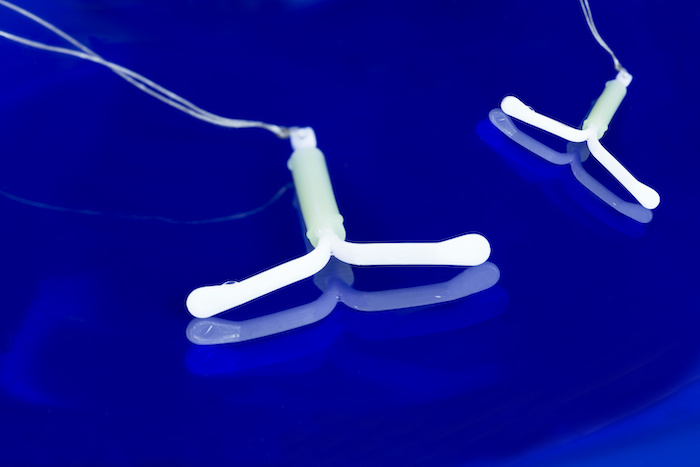Women may choose to use birth control for a variety of reasons from preventing pregnancy to regulating the menstrual cycle or relieving PMS symptoms. There are different types of birth control methods, each with their own pros and cons. In recent years, one method, in particular, has continued to gain popularity among both women and providers–intrauterine devices (IUD). But, what exactly are they and what are the benefits of an IUD?
What is an IUD?
You’ve likely seen one in a photo or at your doctor’s office. An IUD is a small, flexible, T-shaped device that is inserted through the vagina, past the cervix and into the uterus in order to prevent pregnancy from occurring. The simple, in-office procedure is completed by a doctor or nurse practitioner in as little as 5-10 minutes.
There are two main types of this device: copper and hormonal. The only copper IUD approved by the FDA in the United States is ParaGard. Skyla, Kyleena, Liletta and Mirena are the brand names of hormonal IUDs on the market.
How They Work
Both hormonal and copper intrauterine devices work by changing the path of sperm so they cannot ultimately reach and fertilize the egg. ParaGard repels sperm with its copper material, as sperm are averse to copper. Hormonal devices thicken cervical mucus, trapping sperm. They also can prevent ovulation, the process in which the egg leaves the ovaries. Therefore, there is no egg to be fertilized.
Benefits of an IUD
There are a variety of benefits of an IUD. They are:
-
- Effective: IUDs are one of the most effective methods of birth control because it limits human involvement. Unlike the pill or ring, you can’t forget to use it and unlike condoms, there isn’t a risk of using it incorrectly. They are more than 99% effective, making IUDs as effective as sterilization and the birth control implant at preventing pregnancy.
- Long-lasting: A copper device can last up to 12 years, while hormones devices remain effective from three to six years depending on the brand used.
- Convenient: Unlike other forms of birth control, you rarely have to worry about an IUD once it’s in place. It works until it expires or you have it taken out. No more running to the pharmacy to pick up your monthly prescription or worrying about remembering to take a pill every day.
- Flexible: An IUD is not permanent and can be removed at any time, for any reason. Getting pregnant is possible immediately upon the removal of the device if you should decide pregnancy is something you desire. In addition, the copper IUD can be used as emergency contraception and is quite effective in this capacity as long as it is inserted within five days of unprotected sex.
- Multi-purpose: A progestin (hormonal) IUD not only works to prevent pregnancy but can also be used to help reduce blood flow for women or girls that have heavy, painful periods.
What are the Side Effects?
As with any type of birth control, there are potential side effects associated with using an IUD.
Once the device is placed, you may experience irregular or breakthrough bleeding for the first few months. With a hormonal device, PMS-like symptoms are also possible including irritability, headaches, acne, nausea and breast tenderness. With the copper IUD, some women may experience heavier periods with more cramps.
Potentially rare side effects include accidental expulsion, perforation of the uterus and pelvic inflammatory disease.
Is an IUD Right For Me?
As you can see, the IUD is a safe, reliable and convenient form of birth control for many women. Your doctor will conduct a medical exam and discuss your history to ensure you are a good candidate if you feel this might be a contraceptive you’d like to consider. Call (919) 876-8225 to schedule an appointment at Raleigh OB/GYN Centre.


